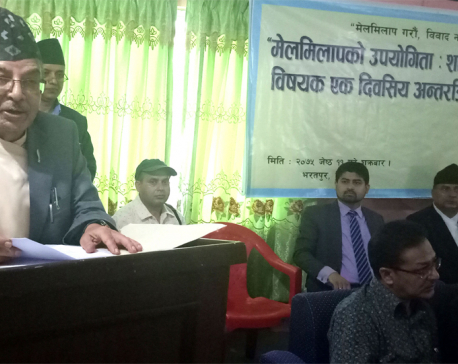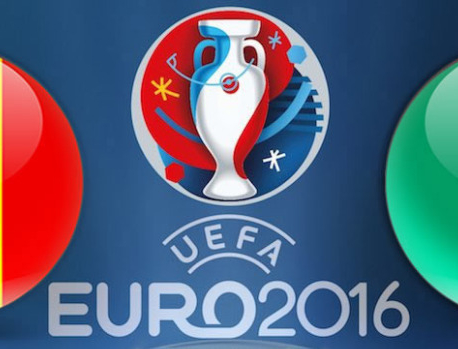
OR
Compromise on both sides made quick unification possible
Published On: May 18, 2018 06:35 AM NPT By: Republica | @RepublicaNepal
KATHMANDU, May 18: Until just two days ago, it was not clear whether unification of the two major communist parties—CPN-UML and CPN (Maoist Center)—would take place as stated by the top leaders of the parties in the past. Even the second-rung leaders of the parties were not sure the party unification process would happen so quickly.
Surprising many, CPN-UML Chairman KP Sharma Oli and Maoist Chair Pushpa Kamal Dahal on Wednesday decided to unite their parties at the earliest. They fixed Thursday as the day for party unification .
The leaders were stuck over a couple of issues—the unified party's guiding principal, the internal organizational structure and post-party unification arrangements for top leaders. Leaders from both the parties said the flexibility adopted by the heads of both sides made swift unification possible .
“It's a kind of give and take among the party chiefs and a commitment to move ahead as per the people's expectations,” said leader Narayan Dahal. “Oli softened his position on unification and agreed to offer an almost equal number of positions to the Maoists.”
Dahal did not want to delay the unification process after acquiring equal status with Oli. The newly formed party has decided to adopt dual leadership. According to the agreement worked out among top leaders, both Oli and Dahal will head the party as chairmen. Also, Oli has agreed in principal to rotate government leadership. Oli will lead the government for three years and Dahal will lead for the remaining two years.
Party insiders say UML Chairman Oli's decision to provide 45 percent of seats in the 441-member central committee of the new party convinced Maoist Chairman Dahal to merge the parties into one.
In the past, the Maoists were seeking a bigger share in the new party. But the UML, which had produced relatively good results in the recent three sets of elections, was refusing to do so. More importantly, both the leaders agreed to adopt dual leadership in the party and move together in respect to people's aspiration for prosperity.
On the new party's guiding principle, the Maoists were demanding People's Democracy of the 21st Century whereas UML was for continuing with its existing People's Multi-Party Democracy (PMPD). UML was rigid against accepting any guiding principle other than PMPD, the multi-party democracy of the communist party propounded by its charismatic leader Madan Bhandari.
But Oli adopted flexibility for the sake of uniting the parties and agreed to People's Democracy as the guiding principle, with a commitment to heading towards socialism. Also, it agreed to accept People's War as an important development in political change.
UML leaders say flexibility from both leaders made the unification process possible. According to them, it was made possible following compromise from both sides.
They have accused both the leaders of skipping democratic exercises in finalizing the party unification process at the center. “This did not happen in a democratic manner. The so-called secretariat is deciding everything without proper discussions in the party,” said party leader Ghanshyam Bhusal, adding, “I cannot say when this unification process will end on the ground if this undemocratic secretariat acts in this fashion.”
You May Like This

Acting Chief Justice says win-win for both sides through mediation
CHITWAN, May 25: Acting Chief Justice of the Supreme Court Deepak Raj Joshi has said both sides of a disputed... Read More...

Quick, quick
Larcha Bridge rebuilding. ... Read More...

Euro 2016 preview Belgium vs Republic of Ireland: Both sides needs victory to make next round
PARIS, June 18: Belgium head into their second match of Euro 2016 needing to beat Republic of Ireland to make... Read More...





Just In
- MoHP cautions docs working in govt hospitals not to work in private ones
- Over 400,000 tourists visited Mustang by road last year
- 19 hydropower projects to be showcased at investment summit
- Global oil and gold prices surge as Israel retaliates against Iran
- Sajha Yatayat cancels CEO appointment process for lack of candidates
- Govt padlocks Nepal Scouts’ property illegally occupied by NC lawmaker Deepak Khadka
- FWEAN meets with President Paudel to solicit support for women entrepreneurship
- Koshi provincial assembly passes resolution motion calling for special session by majority votes






_20220508065243.jpg)






Leave A Comment